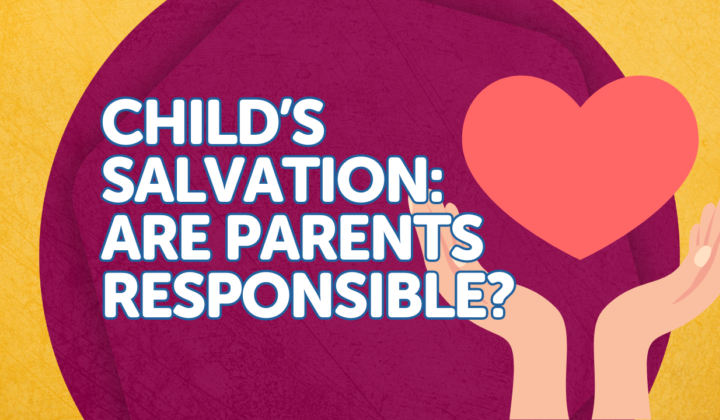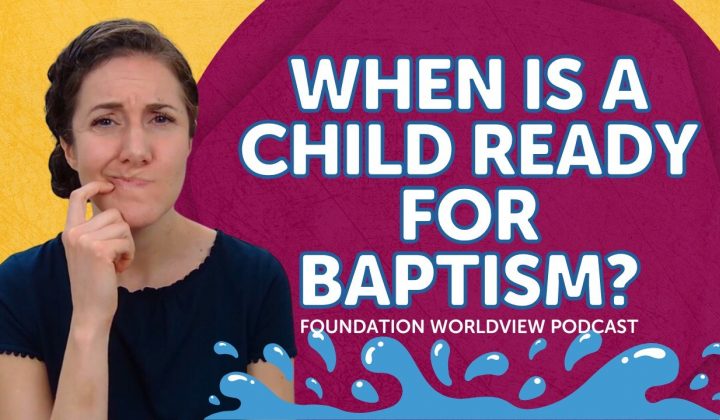Learn more about the journey that led to us equipping kids to carefully evaluate every idea they encounter.
Meet members of our team who have contributed to curriculum development.
Hear from real users of the Foundation Curriculum.
Learn what we believe about God, Jesus, Scripture, and more.
Helping Kids Find Assurance of Salvation
Today's podcast question says: “I talk often with my 8-year-old about the gospel and the truth of Scripture. She loves God but expresses concern that He may not let her into heaven. I tell her what the Bible tells us, but I know it's hard for her young mind to grasp. How can I help put her at ease?”
This is a question I know many parents face—just thinking about assurance of salvation with our children. So that’s exactly what we’re going to dive deep into today on the Foundation Worldview Podcast, where we seek to answer your questions so you can equip the children God has placed in your care to carefully evaluate every idea they encounter and understand the truth of the biblical worldview.
I'm your host, Elizabeth Urbanowicz, and I’m thrilled you’ve joined me for another episode today.
Now, before we dive into this topic, if you've found the content of this podcast beneficial in the past, would you take just a few seconds to rate and review it wherever you’re watching or listening? That really helps us accomplish our goal of getting this content into the hands of more Christian adults who are seeking to equip their children to think critically and biblically.
As we think about this fear of not being assured of salvation, I want to encourage anyone in this situation to remember—most fears like this are not calmed by one rational explanation. It usually takes time to get to the root of where that fear is coming from and to consistently remind our children of the truth.
So, I’d encourage the parent who asked this question—and anyone else whose child is wrestling with fear over their salvation—to ask some thoughtful questions to get to the root of the fear.
One good question to ask is, “Why are you scared God won’t let you into heaven?”
It may be that your child is simply scared of the future. Or it could be that they’re worried a certain sin pattern in their life is going to keep them from God. Maybe there's a specific event—something they’ve done or not done—that’s weighing on them. So starting with that question is a great way to begin.
Another helpful question is: “Why would someone not be with God in the new heaven and the new earth after they die?”
Ask them to actually think through why God wouldn’t allow someone to be with Him.
Then follow up with a similar question: “Why would God allow someone into His presence in the new heaven and the new earth?”
Your child’s responses to these questions will help you gauge whether they truly understand the gospel.
For example, if they respond, “Because God didn’t like that person,” that’s not biblical at all. God doesn’t reject someone because He dislikes them. In fact, God created each of us in His image, and what separates us from Him is our sin. So listen carefully to your child’s answers—they’ll reveal a lot.
After identifying those responses, I recommend taking your child to Scripture. If we only comfort them with our own words, that’s not true assurance. Assurance of salvation doesn’t come from human wisdom or comfort—it comes from God and His Word.
Depending on how your child answers those questions, you may want to take them to various Scriptures—either to correct their misunderstanding or affirm what they’ve rightly understood.
Let me walk you through three passages that I think are particularly helpful in this situation.
The first is 1 John 5:11–13, where John writes:
“And this is the testimony, that God gave us eternal life, and this life is in His Son. Whoever has the Son has life; whoever does not have the Son of God does not have life. I write these things to you who believe in the name of the Son of God, that you may know that you have eternal life.”
You can read this passage with your child and say, “What does this say about salvation?”
It tells us that whoever has the Son has life. If we believe in Jesus—if we trust Him—we don’t just hope or wish we have eternal life. We know. This is knowledge we can rest in.
Another great passage is John 1:11–13, which says:
“He came to His own, and His own people did not receive Him. But to all who did receive Him, who believed in His name, He gave the right to become children of God—who were born, not of blood nor of the will of the flesh nor of the will of man, but of God.”
Ask your child, “Who are those who become children of God?”
And help them see the answer: those who believe in His name. This is God’s doing, not ours.
The final passage I recommend is a longer one, but incredibly powerful: Romans 8:31–39. It reads:
“What then shall we say to these things? If God is for us, who can be against us?
He who did not spare His own Son but gave Him up for us all, how will He not also with Him graciously give us all things?
Who shall bring any charge against God’s elect? It is God who justifies.
Who is to condemn? Christ Jesus is the one who died—more than that, who was raised—who is at the right hand of God, who indeed is interceding for us.
Who shall separate us from the love of Christ? Shall tribulation, or distress, or persecution, or famine, or nakedness, or danger, or sword?
As it is written:
‘For your sake we are being killed all the day long; we are regarded as sheep to be slaughtered.’
No, in all these things we are more than conquerors through Him who loved us.
For I am sure that neither death nor life, nor angels nor rulers, nor things present nor things to come,
nor powers, nor height nor depth, nor anything else in all creation, will be able to separate us from the love of God in Christ Jesus our Lord.”
Read this with your child and talk through it: “If God is for us—if we’ve repented of our sins and trusted in Jesus—who can be against us? Nothing can separate us from God’s love.”
Now, these verses may not bring instant emotional peace to your child. They may still worry about whether they’re truly saved. But these are passages you can return to again and again—anchoring them in the truth.
Think about your own life. I know in my life, there are some truths God has had to teach me 5, 8, 10, even 12 times before they really stick. It may be the same with our children.
These are passages we can go to repeatedly to show them that salvation is from God—that He is the one who saves, and He doesn’t cast out those He has saved.
Something else for us to consider: sometimes we believe that because our child prayed a certain prayer, they’re saved. But there are no magic words that save us. Salvation comes from a heart that has truly repented of sin and trusted in Christ.
If our child doesn’t show any remorse when they sin…
If they don’t willingly repent…
If we don’t see them slowly growing in the fruit of the Spirit…
Then we should be cautious in assuming they’re a believer.
Now, I’m not saying that if a child struggles to show remorse, they’re definitely not saved. Christians can still struggle with hardness of heart. But if we consistently see a lack of conviction, repentance, and spiritual growth, we need to be honest with ourselves that they may not yet have truly turned to Christ.
In those situations, we shouldn’t focus all our energy on giving assurance. Instead, we should keep pointing them to the gospel itself.
Here are two more passages you can take your child to as you focus on the gospel:
The first is 2 Corinthians 5:17–21:
“Therefore, if anyone is in Christ, he is a new creation.
The old has passed away; behold, the new has come.
All this is from God, who through Christ reconciled us to Himself and gave us the ministry of reconciliation.
That is, in Christ, God was reconciling the world to Himself, not counting their trespasses against them,
and entrusting to us the message of reconciliation.
Therefore, we are ambassadors for Christ, God making His appeal through us.
We implore you on behalf of Christ, be reconciled to God.
For our sake, He made Him to be sin who knew no sin,
so that in Him we might become the righteousness of God.”
You can read this with your child and ask, “What does it mean to be a Christian?”
Talk about the old passing away, the new coming, and how this is only possible through Jesus becoming sin for us so we could be reconciled to God.
Another great passage is Romans 8:1–8, which reads:
“There is therefore now no condemnation for those who are in Christ Jesus.
For the law of the Spirit of life has set you free in Christ Jesus from the law of sin and death.
For God has done what the law, weakened by the flesh, could not do.
By sending His own Son in the likeness of sinful flesh and for sin, He condemned sin in the flesh,
in order that the righteous requirement of the law might be fulfilled in us,
who walk not according to the flesh but according to the Spirit.
For those who live according to the flesh set their minds on the things of the flesh,
but those who live according to the Spirit set their minds on the things of the Spirit.
For to set the mind on the flesh is death, but to set the mind on the Spirit is life and peace.
For the mind that is set on the flesh is hostile to God,
for it does not submit to God's law; indeed, it cannot.
Those who are in the flesh cannot please God.”
Help your child compare the life of the flesh and the life of the Spirit.
Are they living for themselves or surrendered to God?
And let them know: “It’s my deepest desire that you would repent and trust in Christ.”
But we can’t pressure someone into surrender. We can encourage, but we can’t manipulate. Only God can soften the heart.
So we pray. We ask God to stir our children’s affections for Him. We trust that He is at work—even when we don’t see immediate change.
My hope is that as you walk away from this podcast, the main takeaway is this:
Ask questions to understand where your child is coming from, and ground your conversations in Scripture.
Your child may not fully believe what Scripture says today—or even a year from now—but trust that God will use His Word in His perfect timing to help them understand what is true.
Well, that’s a wrap for this episode.
If you have a question you'd like me to answer on a future Foundation Worldview podcast, you can submit it by going to foundationworldview.com/podcast.
As we close, my prayer is that no matter the situation you and the children God has placed in your care find yourselves in, you would trust that God is working all things together for your good and shaping you into the image of His Son.
I'll see you next time.
Related Posts and insights

Are Parents Responsible for Their Child's Salvation?
Today's question says, "Am I responsible for my children's salvation? I get very contradicting messages from people. My pastor says it's God's responsibility, but I can't shake the feeling that I will answer God for what my children choose at the end of the day."

When is a Child Ready for Baptism?
In this episode of the Foundation Worldview Podcast, we discuss the contentious topic of baptism and how to know when a child is ready for it. We also explore how to handle family animosity that may arise from differing views on baptism. Tune in as we dive into understanding the differences between infant baptism and believers' baptism and provide advice on how to approach this sensitive issue with wisdom and grace.

How To Help Kids Discern The True Gospel From A False Gospel
The false gospel comes in numerous forms. Equip your kids and your family to tell the difference and embrace the true gospel.



